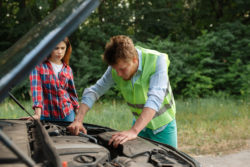Top Class Actions’s website and social media posts use affiliate links. If you make a purchase using such links, we may receive a commission, but it will not result in any additional charges to you. Please review our Affiliate Link Disclosure for more information.
There’s more to love about a new car than the new car smell. There’s the peace of mind that usually comes from knowing it’s going to be a long time before you have to worry about breakdowns, flashing indicator lights, and suspicious engine sounds.
Unless you’re unlucky enough to end up with a lemon, that is.
Every state in the U.S. has some kind of lemon car law. While some of these laws offer few consumer protections and only cover specific types of vehicles, others offer wider protections and require manufacturers to pay for all of the costs associated with replacing a defective car or truck.
Luckily most states offer some consumer protection such as that provided by the lemon law in Louisiana. Compared to many other states’ lemon laws, the lemon law in Louisiana offers additional protections for consumers who have purchased defective vehicles.
What is the Lemon Law in Louisiana?
The lemon law in Louisiana gives consumers who buy or lease a motor vehicle with a “nonconformity” the right to a refund or replacement from the manufacturer. According to the Better Business Bureau, a nonconformity is defined as “a specific or generic defect or malfunction, or any defect or condition that substantially impairs the use and/or market value of a motor vehicle,” a summary of the law published by BBB National Programs says.
People who have purchased a lemon are entitled to a replacement vehicle or a refund. The owner can request either, but the vehicle manufacturer has the right to issue a refund either way.
An owner refund, under the terms of the lemon law in Louisiana, is the full purchase price of the vehicle plus any sales tax, finance charges, license and registration fees less a reasonable allowance for the previous use of the vehicle. A refund on a leased vehicle calls for the manufacturer to satisfy the outstanding lease and any early termination charges and to reimburse the lessee for any “reasonable expenditures”.
Although auto manufacturers are required to pay for these additional costs, some consumers have reported that they were not able to obtain reimbursement for the costs of titles, taxes, or fees. As these costs are a mandatory part of replacing a defective vehicle, an experienced attorney may be able to help you understand what your legal rights are.
Is There a Lemon Law in Louisiana for Used Cars?
Technically, the lemon law in Louisiana also covers used cars because it does not restrict its protections to the original owner of an eligible motor vehicle. Still, the same requirements are in place – the vehicle itself cannot be more than a year old or its original warranty expired, consumer finance website PocketSense explains.
 Which Vehicles Can Be Classified as Lemons?
Which Vehicles Can Be Classified as Lemons?
The lemon law in Louisiana applies to any car, truck or van designed and used to transport passengers or goods for public, private, or commercial purposes as long as it was sold in Louisiana.
Also covered by the law are personal watercraft and all-terrain vehicles – not commercial ones – and all chassis and drivetrains of motor homes sold in Louisiana.
Motor vehicles with a gross vehicle weight rating of 10,000 or more, except for motor homes, and motor vehicles used only for commercial purposes are not covered by the lemon law in Louisiana.
Vehicles purchased in other states are also not covered by the law.
In order for a vehicle to qualify as a lemon, it must have problems that resist being fixed and are significant enough to have a major impact on the safety or value of the vehicle. There are many types of problems that may qualify a vehicle as a lemon. Common defects associated with lemons include issues with the brakes or power steering, airbag defects, mold in the air conditioner, seat belt failure, electrical issues, malfunctions with cruise control, fuel injection system leaks, transmission failure, or sudden and uncontrolled acceleration or deceleration.
In some cases, cosmetic defects such as issues with the paint job or a persistent bad smell inside the vehicle may reduce the value of the vehicle by enough to qualify it as a lemon.
How Does the Lemon Law in Louisiana Work?
To be considered a lemon in Louisiana, the law requires a vehicle to be no more than a year old or still under warranty and have a “nonconformity” that significantly affects its use, value, or safety. The problem must be one that the manufacturer or dealer did not or could not repair after four attempts to do so, or the vehicle must have one or more nonconformities that kept it out of service for 90 days or more.
If the vehicle is a motor home, the manufacturer is allowed one more repair attempt after the standard allowances before a refund or replacement is required.
Anyone unlucky enough to own or lease what turns out to be a lemon in Louisiana can submit a claim and offer to return the defective vehicle directly to the manufacturer. The law requires the manufacturer to issue a refund or deliver a replacement within 30 days or if the claim is denied and the two parties submit to arbitration, within 30 days after a decision in favor of the consumer.
Are There Any Statute of Limitations?
Per the terms of Louisiana’s lemon law, the claims process must begin within one year after the vehicle’s original warranty expires or three years after the vehicle was purchased, whichever is later. A person leasing a lemon must file a claim within the term of the lease.
How Can a Louisiana Lemon Law Attorney Help?
If a lemon law claim is denied, and the manufacturer has an arbitration program certified by the state of Louisiana, the owner/lessee must submit to arbitration before taking the claim to court. If the outcome is unfavorable, or the automaker doesn’t have a certified program, the consumer can file a lawsuit.
Navigating the lemon law in Louisiana can be difficult to do alone. Top Class Actions can put consumers in touch with lawyers who specialize in lemon law litigation and can help at any point in the process. Even if you have been offered compensation for your lemon already, an experienced attorney may be able to review your offer and determine whether the manufacturer has accounted for all of the fees and taxes they are required to pay for.
Join a Free Lemon Law Defective Vehicle Investigation
You may qualify for this Lemon Law investigation under the following circumstances:
- You purchased your vehicle new;
- Your purchased your vehicle in 2018-2020;
- Your vehicle is still under warranty;
- You have taken your vehicle in for repair several times; and
- It is still having the same problem.
(Note: Residents of North Carolina do not qualify for this investigation.)
See if you qualify by filling out the form on this page for a case evaluation by experienced Lemon Law lawyers or call (877) 289-0615.
ATTORNEY ADVERTISING
Top Class Actions is a Proud Member of the American Bar Association
LEGAL INFORMATION IS NOT LEGAL ADVICE
Top Class Actions Legal Statement
©2008 – 2024 Top Class Actions® LLC
Various Trademarks held by their respective owners
This website is not intended for viewing or usage by European Union citizens.
Get Help – It’s Free
Join a Free Lemon Law Defective Vehicle Investigation
If you qualify, an attorney will contact you to discuss the details of your potential case at no charge to you.
PLEASE NOTE: If you want to participate in this investigation, it is imperative that you reply to the law firm if they call or email you. Failing to do so may result in you not getting signed up as a client or getting you dropped as a client.
Oops! We could not locate your form.


 Which Vehicles Can Be Classified as Lemons?
Which Vehicles Can Be Classified as Lemons?










